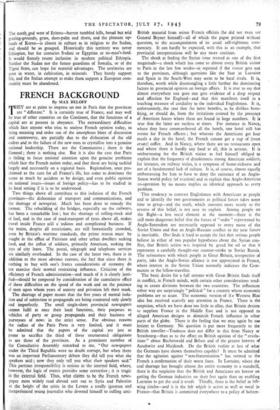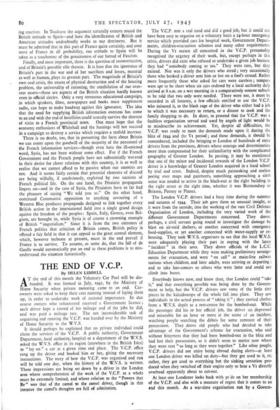FRENCH BACKGROUND
By MAX BELOFF
THEY are at pains to impress on one in Paris that the provinces are " different." It is certainly true of France, and may well be true of other countries on the Continent, that the functions of a capital are at present in abeyance. The extraordinary difficulties which face anyone who tries to analyse French opinion today, to bring meaning and order out of the amorphous blare of discussion and controversy, are partially due to the dislocation of the old cadres and to the failure of the new ones to crystallise into a genuine national leadership. There are the Communists ; there is the General; there is nothing else. But it is also the case that Paris is failing to focus national attention upon the genuine problems which face the French nation today, and that these are being tackled largely and necessarily on a regional basis. Regionalism, once pro- claimed as the cure for all France's ills, has come to dominate the scene as much by accident as by design, and even public opinion on national issues—issues of foreign policy—has to be studied in its local setting if it is to be understood.
Two things above all contribute to this isolation of the French provinces—the dislocation of transport and communications, and the shortage of newsprint. Much has been done to remedy the former. The rebuilding of the bridges, especially on the railways, has 'been a remarkable feat ; but the shortage of rolling-stock and of fuel, and in the case of road-transport of tyres above all, makes travel inside France still a tedious and complicated business. If the trains, despite all restrictions, are still fantastically crowded, even by Britain's wartime standards, the prime reason must be sought in the efflux of Parisians and other urban dwellers seeking food, and the influx of soldiers, primarily American, seeking the joys of city leave. The postal, telegraph and telephone services are similarly overloaded. In the case of the latter two, there is in addition to the more obvious reasons, the fact that since there is nothing to buy with one's francs considerations of economy do not exercise their normal restraining influence. Criticism of the efficiency of French administration—and much of it is clearly justi- fied—should be tempered by consideration of the cumulative effect of these difficulties on the speed of the work and on the patience of men upon whom years of anxiety and privation left their mark.
The shortage of paper means that the five years of mental isola- tion and of subjection to propaganda are being countered only slowly and imperfectly. The small single-sheet provincial newspapers cannot fulfil at once their local functions, their purposes as vehicles of party or group propaganda and their business of purveyors of news in the strict sense. For obvious reasons the radius of the Paris Press is very limited, and it must be admitted that the papers of the capital are just as prone to sacrifice the third of these enumerated obligations as are those of the provinces. As a prominent member of the Consultative Assembly remarked to me, " Our newspapers under the Third Republic were no doubt corrupt, but when there was an important Parliamentary debate they did tell you what the speakers said ; now they only tell you what their speakers said." This partisan irresponsibility is serious in the internal field, where, however, the logic of events provides some corrective ; it is tragic in the external field. Thus, what claims to be the French news- paper most widely read abroad sent out to Syria and Palestine at the height of the crisis in the Levant a totally ignorant and inexperienced young journalist who devoted himself to culling anti-
British material from minor French officials (he did not even see General Beynet himself)--all of which the paper printed without question, to the accompaniment of its usual self-righteous com- mentary. It can hardly be expected, with this as an example, that provincial interpretations will be any more cautious.
The shock at finding the Syrian issue treated as one of the first magnitude—a shock which has come to almost every British visitor to Paris in the last few weeks—is repeated if the visitor gets out to the provinces, although questions like the Saar in Lorraine and Spain in the South-West may seem to be local rivals. It is, therefore, worth while disentangling a little further the dominating factors in provincial opinion on foreign affairs. It is true to say that almost everywhere one goes one gets evidence of a deep respect and affection for England—and that this manifests itself in a touching measure of cordiality to the individual Englishman. It is, unfortunately, the case that the latter benefits, as he dislikes bene- fiting, or should do, from the irritations created by the presence of American forces where these are found in large numbers. It Is true that the latter are tactless at times. For instance in Nancy, where they have commandeered all the hotels, one hotel still has rooms for French officers ; but whereas the Americans get four meals a day in the hotel, the French cannot get a cup of (even ersatz) coffee. And in Nancy, where there are no restaurants open and where there is hardly any food at all, this is serious. It is embarrassing for the British visitor to feel himself obliged to explain that the frequency of drunkenness among American soldiers, for instance, on railway trains, is a symptom of home-sickness and not of a fundamental lack of culture. It is, of course, almost equally embarrassing for him to have to deny the existence of an Anglo- Saxon world policy (of reaction) and to explain that Anglo-American co-operation by no means implies an identical approach to every problem.
This tendency to contrast Englishmen with Americans as people and to identify the two governments as political forces takes some time to grasp—and the truth, which amounts more nearly to the reverse of this belief, is not easy to explain. Among people on the Right—a less vocal element at the moment—there is the still more dangerous belief that the forces of " order " represented by Anglo-Saxondom are necessarily opposed to every move of the Soviet Union and that an Anglo-Russian conflict in the near future is inevitable. One finds it hard to accept the fact that serious people believe in either of two popular hypotheses about the Syrian con- flict, that British action was inspired by greed for oil or that it represents a carefully thought-out counter-stroke to Soviet Russia. The seriousness with which people in Great Britain, irrespective of party, take the Anglo-Soviet alliance is not appreciated in France, where interest in the Soviet Union normally indicates the Com- munist or the fellow-traveller.
The basic desire for a full entente with Great Britain finds itself in conflict, in French minds, with certain other considerations tend- ing to create divisions between the two countries. The influences either way are surprisingly " political" for a country whose economic problems are so acute. The economic version of the Western Bloc idea has received scarcely any attention in France. There is the suspicion, which we have done too little to allay, that Britain desires to supplant France in the Middle East and is not opposed to alleged American designs to diminish French influence in other parts of the globe. There is the feeling that we may again be too lenient to Germany. No question is put more frequently to the British traveller—Toulouse does not differ in this from Nancy or Strasbourg—than as to the effect on British opinion of the " revela- tions" about Buchenwald and Belsen and of the greater horrors of Auschwitz and Maidenek. Do the British realize at last of what the Germans have shown themselves capable? It must be admitted that the agitation against " non-fraternisation " has seemed to the French a confirmation of their worst fears. In Lorraine, where the coal shortage has brought almost, the entire economy to a standstill, there is the suspicion that the British and Americans are keener on getting the German industries on their feet again than on enabling Lorraine to get the coal it needs Thirdly, there is the belief in left- wing circles—and it is the left which is active as well as vocal in France—that Britain is committed everywhere to a policy of bolster- ing reaction. In Toulouse the argument naturally centres round the British attitude to Spain—and here the identification of British and American attitudes undoubtedly works to our detriment. But it must be admitted that in this part of France quite certainly, and over most of France in all probability, our attitude to Spain will be taken as a touchstone of the genuineness of our hatred of Fascism.
Finally, and most important, there is the question of reconstruction, and of Britain's possible role therein. It is here that the ignorance of Britain's part in the war and of her sacrifices and losses, material as well as human, plays its greatest part. The magnitude of Britain's own coal crisis, the extent of physical destruction and of the housing problem, the universality of rationing, the annihilation of our over- seas assets—these are aspects of the British situation hardly known even in official circles. Only a very strenuous educational campaign, in which speakers, films, newspapers and books must supplement radio, can hope to make headway against this ignorance. The idea that the need for supplying British information overseas has come to an end with the end of hostilities could scarcely survive the shortest
of visits to a French provincial town. One must hope that the economy enthusiasts of Whitehall and the hustings will not succeed in a campaign to destroy a service which requires a tenfold increase.
There is no doubt, too, that in presenting the facts about Britain we can count upon the goodwill of the majority of the personnel of the French information services—though even here the ill-omened word, Syria, has not been without some effect. For if the French Government and the French people have not substantially wavered in their desire for closer relations with this country, it is as well to realise that we cannot afford to be passive when our enemies are not. And it seems fairly certain that potential elements of discord are being wilfully, if unobviously, exploited by two sections of French political life. On the one hand, the Petainist propaganda lingers on—and in the case of Syria, the Petainists have so far had the pleasure of saying " We told you so." On the other hand, continued Communist opposition to anything savouring of a Western Bloc produces propaganda designed to link together every British action in the international field into a single grand design against the freedom of the peoples: Spain, Italy, Greece, even Bel- gium, are brought in, while Syria is of course a crowning example of British " imperialism." Since it is from the two extremes of French politics that criticism of Britain comes, British policy is offered a fair field in that it can appeal to the great central element, which, however inchoate at present, must in the end prevail if France is to survive. To assume, as some do, that the fall of de Gaulle would automatically put an end to these problems is to mis- understand the situation fantastically.



























 Previous page
Previous page